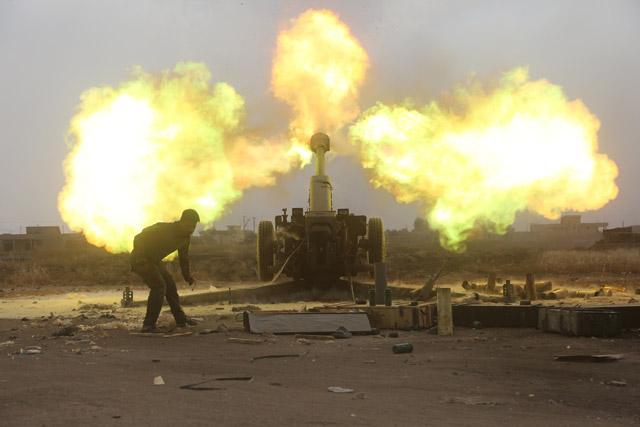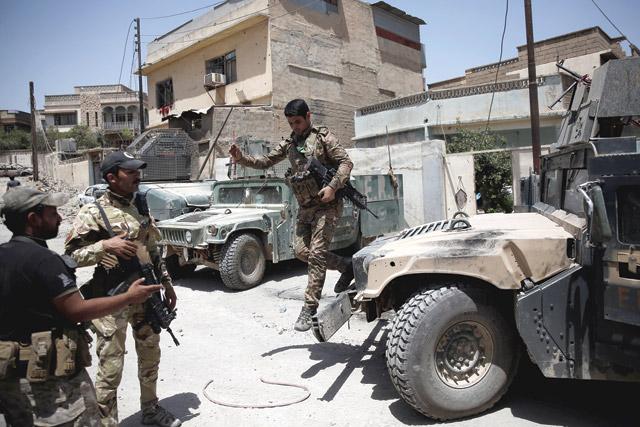You are here
Iraqi forces launch operation to seize last Daesh enclave in Mosul
By Reuters - May 27,2017 - Last updated at May 27,2017

Popular Mobilisation Forces fire towards Daesh militants during a battle on the outskirts of Al Ba'aj, west of Mosul, Iraq, on Friday (Reuters photo)
BAGHDAD/MOSUL — Iraqi armed forces launched an operation on Saturday to capture the last Daesh-held enclave in Mosul, according to a military statement.
The fall of the city would, in effect, mark the end of the Iraqi half of the "caliphate" declared nearly three years ago by Daesh leader Abu Bakr Al Baghdadi, which also covers parts of Syria.
The enclave includes the Old City centre and three adjacent districts along the western bank of the Tigris River.
The US-backed offensive in Mosul, now in its eighth month, has taken longer than planned as the militants are dug in among civilians.
"The joint forces have began liberating the remaining districts," an Iraqi military statement said.
Another military statement announced the death of two Iraqi colonels during the fighting on Saturday.
Desperate civilians trapped behind Daesh lines now face a harrowing situation with little food and water, no electricity and limited access to hospitals.
The Iraqi air force dropped leaflets on Friday urging residents to flee but humanitarian groups say they fear for the safety of those trying to escape.
Black flag flying
since 2014
The push inside the Old City coincides with the start of the holy fasting month of Ramadan. The offensive's prime target is the medieval Al Nuri Mosque with its landmark leaning minaret, where Daesh’s black flag has been flying since mid-2014.
Iraqi armed forces hope to capture the mosque — where Baghdadi announced the "caliphate" — in the next few days.
Residents in the Old City sounded desperate in telephone interviews over the past few days.
"We're waiting for death at any moment, either by bombing or starving," one said, asking not to be identified. "Adults eat one meal a day, either flour or lentil soup."
The United Nations expressed deep concern for the hundreds of thousands of civilians behind Daesh lines, in a statement on Saturday from the organisation's under-secretary general for humanitarian affairs, Stephen O'Brien.
“Although the UN is not present in the areas where fighting is occurring, we have received very disturbing reports of families being shut inside booby-trapped homes and of children being deliberately targeted by snipers,” he said.
Residents said millet, usually used as bird feed, is being cooked like rice as food prices increased ten-fold. People were seen collecting wild mallow plants in abandoned lots and also eating mulberry leaves and other plants.
About 700,000 people, about a third of the pre-war city’s population, have already fled, seeking refuge either with friends and relatives or in camps.
The insurgents are also retreating in Syria, mainly in the face of US-backed Kurdish-led forces.
The insurgency is expected to continue in the sparsely populated desert region along the Syrian border even if Mosul is fully captured.
Iranian-backed Shiite paramilitary forces are fighting Daesh in that part of the country where Baghdadi is believed to be, according to US and Iraqi officials.
On Saturday, Iran announced for the first time the death of a senior commander during the operations launched in October to drive the militants out of Mosul and the surrounding Nineveh province.
Shaaban Nassiri, a senior commander of Iran’s Islamic Revolutionary Guards Corps (IRGC), was killed west of Mosul, near the border with Syria, according to Mashregh, an Iranian news website.
The IRGC is the main backer of the Iraqi Shiite paramilitary force known as Popular Mobilisation. Iraq’s Shiite-led government is aiming to control the border in coordination with the Iranian-backed Syrian army..
Linking up the two sides would give Syrian President Bashar Assad a significant advantage in the six-year rebellion against his rule.
Related Articles
BAGHDAD — A senior commander of Iran's Islamic Revolutionary Guards Corps (IRGC) was killed fighting Daesh west of the Iraqi city of Mosul,
BAGHDAD — Iraq's Iran-backed Shiite paramilitary force said on Sunday it had dislodged the Daesh terror group from a number of villages west
BARTELLA, Iraq — Iraqi special forces battling to clear the Daesh terror group from eastern Mosul have killed nearly 1,000 militants, but fi













